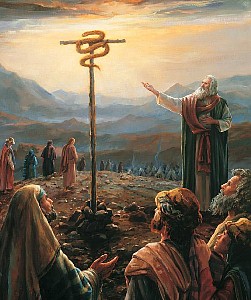The multiple layers of history around the feast of the Exaltation of the Holy Cross makes it one of the most enduring days in the Christian kalendar. It is an important day in both the Roman and Byzantine rites, enjoying the equivalent of a lesser octave in the Greek liturgy, complete with a "pre-feast" and a "leave taking" on the 21st of the month. As the story goes, Constantine's pious mother, St. Helena, found the Cross in Jerusalem and the locals celebrated by lighting a bonfire. The people in the next town saw the fire and lit their own, with contiguous towns imitating the pyrotechnics until flames reached the Eternal City. Constantine encased the Lord's Cross in silver, gold, and precious gems and build the Church of the Holy Sepulchre (or Resurrection), which was dedicated on September 13th. At a later time Persians captured the True Cross, which was only returned because of the guile of Heraclius. Heraclius returned the Cross to Jerusalem on September 14th, the feast we observe today. In the Roman rite the "Invention", or finding, of the Holy Cross is observed as a Double of II Class on May 3rd. So much for the history.
When Constantine encased the Cross in precious metals and gems, the Romans still used crucifixion as a means of capital punishment for the most despicable of persons. Romans held crucifixion to be such a horrible means of death that the laws of the Empire exempted condemned citizens from its cruelty, as was the case of Saint Paul. To exalt a cross would be like to exalt hanging, drawing, and quartering in Tudor England. Perhaps the emperor did not encrust the tool of the Lord's Passion only to glorify it, but also to sanitize it, to make it less a scandal to the people of the Empire. The Cross is a triumph, a triumph over death accomplished by a very gruesome death.
On the Cross our Lord saved us from death and explained suffering to us. When He began His earthly ministry He told a Pharisee, "They that are well have no need of a physician, but they that are sick do. I came not to call the just, but sinners" (Mark 2:17). To modern minds chapter 21 of the Book of Numbers has the overtly medicinal imagery. Medicine has adapted the caduceus, the image of a staff entwined with two serpents used by the Greeks in antiquity. It is not directly related to the staff mentioned in Scripture, but the use of the caduceus in a Christian-influenced society cannot be discarded. The Israelites spoke against God, Who in turned unleashed punishing serpents upon them. In a seemingly pointless change of course, God told Moses to fashion a "brazen serpent" and raise it on a rod. All who looked upon the rod, regardless of the infirmities brought by the snakes which punished them for their disbelief, lived. The Cross brought meaning and fulfillment to this symbol, which is empty of any value without the Cross. On the Cross, Christ did for men's souls what a doctor does for men's bodies. How many are potentially lost because they refuse the difficulties of spiritual treatment?
The Cross is the Body of Christ's vaccination against death. Vaccines traditionally inoculate recipients from diseases and other harmful influences by introducing a small amount of that danger into the body and allowing the immune system to become familiar with it, fight it, and defeat it. The disease can no longer harm the vaccinated person. The same is true of mankind, death, and the Body of Christ. Our Lord did not vaccinate Himself from death, from which He rose on His own, but those who would eventually be joined to His Body through Baptism and Communion. The third responsory at Mattins today says, "Wherein the Author of salvation triumphed over death by His own death," echoing the Paschal troparion in the Greek liturgy, "Christ is risen from the dead and by His death He has trampled upon death...."
Our vaccination is quite a scandal in the Greek sense of the word, scandolos, a barrier or stumbling block. Death frightens man. It is uncertainty, loss, despair, and the result of our sins, yet through it eternal happiness comes. The same is true of suffering. A little suffering borne in the Sacraments and the protection of the Saints, although it can last a lifetime, protects us from an eternity of unhappiness.
Perhaps with the loss of Christian culture and society we can strip away the silver, gold, and diamonds that have encrusted the Cross over time and look upon it for what it actually is: our vaccination from suffering, death, and Hell, our treatment from the "Physician of our souls and bodies" that will lead us to life everlasting.


No comments:
Post a Comment